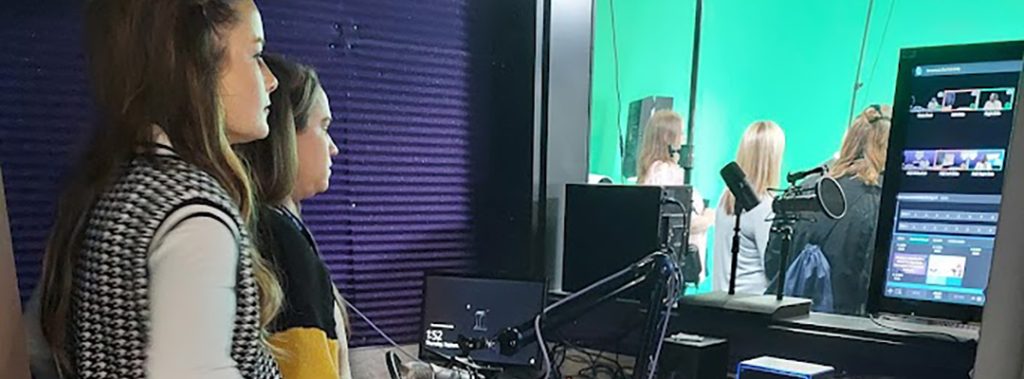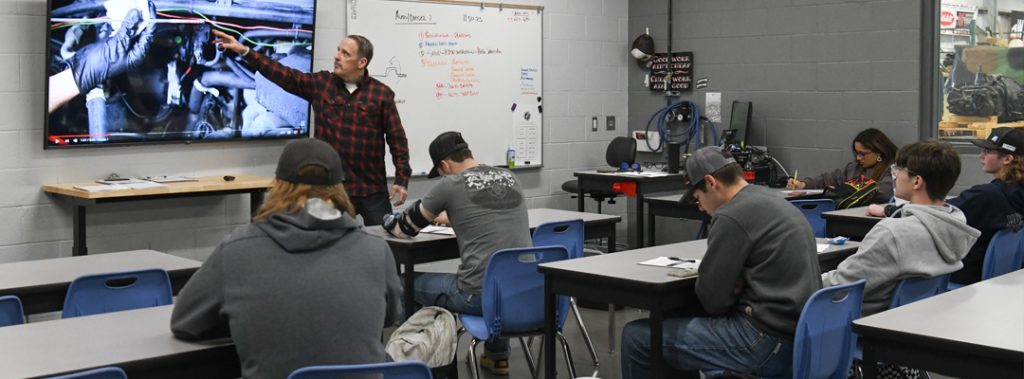Category: News
Digital media production program shapes future leaders in broadcasting


Davey Steele was always an athlete, so it was a natural fit when he got a work-study job running the video board, replay system, and shot clock for Vandal games at the University of Idaho’s Kibby Dome.
After he graduated with a degree in advertising in 2012 and had trouble finding a job, he started teaching economics, business, and merchandising at Lewiston High School (LHS). Before long, Steele found himself in a familiar spot: running the scoreboard, video board, and shot clocks at LHS’s basketball games. One night, Steele struggled to run all the equipment, plus play music during time outs on his own.
“It was absolutely crazy, and I needed help,” Steele recalls. “At some point, I thought, ‘I could teach my students to do this.’” Steele approached his principal about teaching the kids video production so they could help run games, and with his support, Steele started a sports broadcasting class as part of the school’s digital media production pathway.
Soon after, Steele requisitioned some lighting and a Tricaster production system for doing live video and graphics, and students started going live on YouTube with their school announcements every morning. This initial investment in equipment allowed the sports broadcasting students to stream the 2022 Golden Throne basketball game, an annual charity event held at Lewis-Clark State College. Their high-quality production received an incredible number of views on YouTube. Steele and his students were so excited they started live-streaming all of LHS’s basketball games.
“Games would end around nine or 9:30 p.m., and we’d have to wheel everything back to the studio to record the daily announcement the next morning. I didn’t like the wear and tear on the equipment,” said Steele.
Then, one of Steele’s students told him about a school in Mississippi with a mobile TV studio in a semi-truck. Steele had heard about Governor Little’s Leading Idaho grant program, so he wrote a grant for $104,000 to create LHS’s own mobile TV studio, complete with a trailer, replay system, monitors, Tricaster, and 300-foot cables.
With the mobile studio, we’ll be able to live stream our games on YouTube, and I believe we’re in a position to get enough views that we can sell ads.
Davey Steele
But Steele’s students’ ambition extends far beyond the studio. As LHS’s BPA, yearbook, and Associated Student Body advisor, Steele also encourages his students to flex their entrepreneurial muscles. One of his students took pictures at school dances and sold flash drives of the unedited images for $20; she raised $1,000 in a single night. Another student developed a marketing plan for the athletic department and used the school’s large-format Epson printer to print banners on sticky vinyl and windscreens to hang in the gym and outdoor facilities. They were sold to local businesses, and she raised $80,000 in a year.
Steele’s innovation and entrepreneurial drive were among the many factors that led to his program receiving an honorable mention in IDCTE’s 2023 Exemplary Program Awards. “We’re well on our way to being self-supported,” said Steele. “I say all this because I hope schools across Idaho can see what we’ve done here and be inspired to do the same.”
Grant transforms Bonners Ferry High School woodworking program


In 2014, Francis Carlson’s career took an unexpected turn. Though she had a certificate in fine woodworking from Selkirk College in Nelson, British Columbia, she struggled to find a job in the post-recession economy. It was then that Carlson, a 2011 Bonners Ferry High School (BFHS) graduate, discovered an opportunity to share her passion for woodworking in education.
Faced with the potential cut of the woodworking program at her alma mater due to the absence of a teacher, Carlson stepped in as a substitute teacher. Her initial reluctance turned into a genuine passion, and with enough experience on the job, she obtained a limited occupational specialist certificate and made the leap into teaching full-time.
“If we want our students to have the best education, we have to give them access to the best equipment,” Carlson affirmed. “Now I’m confident my students have that.”
Francis Carlson
Over the past nine years, Carlson has earned a bachelor’s degree in technical education and will finish a master’s degree in curriculum development from the University of Idaho. She has also become a fervent advocate for technical education and the imparting of practical employability skills.
“I’m passionate about CTE. I feel like this is where we should be directing our time, energy, and resources,” said Carlson.
Under Carlson’s guidance, the BFHS woodworking program has blossomed. Students start the program learning basics in shop safety, small tools and machines, as well as measuring and layout concepts. Students focus intensively on standards, planning, materials, drafting, and reading plans in their second year. The curriculum emphasizes lean manufacturing principles and includes techniques such as gluing and computer numerical control engraving for personalization. In their third year, students delve into the intricacies of cabinet joints, doors, and drawers, culminating in constructing cabinets for various locations at BFHS, such as classrooms, the principal’s office, and the shop toolroom. In the final year of cabinets, students dive deeper into cabinetry and fine woodworking learning advanced skills like veneering, glass etching, table construction and joints, with special emphasis on cabinet and furniture production.
Carlson actively collaborates with local employers to understand their needs, establish internships, and cultivate positive relationships with businesses. She also strives to give her students experience with industry-standard equipment so they can meet employers’ expectations on the job.
However, acquiring the necessary resources can be challenging in a small school within a small district. Though Carlson has made consistent upgrades and improvements since she began teaching, there’s one piece of equipment she hasn’t been able to replace: a dust collector originally installed in 1992. This vital component removes sawdust and woodchips, ensuring clean air and a safe work environment for students. The existing collector showed signs of wear and tear, but the financial burden of a $200,000 replacement was daunting for a small school.
Undeterred, Carlson used her grant-writing skills and applied for a Leading Idaho grant. In September 2023, she secured a $250,000 grant, not only covering the replacement of the dust collector but also upgrading the planer, drum sander, and jointer. The equipment is currently being manufactured, with the installation expected in January or February 2024.
Despite the temporary inconveniences during the installation, Carlson is optimistic about the new, more efficient equipment and how it will contribute to a dynamic and engaging educational experience. “If we want our students to have the best education, we have to give them access to the best equipment,” Carlson affirmed. “Now I’m confident my students have that.”
Diesel technology teacher bridges gap between industry and education


Paul Rood always liked cars, so it came as no surprise that after high school graduation in the late 1980s, he enrolled in Universal Technical Institute’s two-year auto diesel degree program and discovered his niche in heavy duty diesel repair.
“I never thought about being a diesel mechanic. Back then, it really wasn’t on my radar for a career,” said Rood. “But I took a diesel class for the heck of it and ended up really liking it.”
After 30 years working for top-tier employers like Peterbilt and Knife River, teaching was never on his radar. But somehow, towards the end of the COVID-19 pandemic, the CTE administrator at Kuna’s Swan Falls High School got a hold of his resume. The person who had been teaching diesel technology resigned unexpectedly, leaving a vacancy for a teacher with industry experience.
“All of my family and friends thought I’d be perfect for teaching, but I’d never really considered it until then,” said Rood. “When I went in for the interview, I was so impressed with the facility, I thought, ‘what the heck?’ and gave it a shot.”
I’m very tenacious, and what I envisioned when I took the job three years ago is pretty much where we’re at right now.
Paul Rood
Though Rood immediately took to the classroom and found students liked and respected him because of his experience, he found pursuing his Degree Based Career Technical Certificate through Idaho State University to fulfill the certification requirements was the most challenging part of his transition from industry veteran to educator.
“I don’t have a college background, so it was really frustrating to learn how to use software and technology platforms that I simply didn’t have to learn or use in the shop,” said Rood. “I think this is a glaring issue not only for me, but for other trades professionals trying to bring their experience to the classroom. Professors simply take for granted this gap in knowledge.”
Fortunately, Rood’s mentors from the Division, Bill Brown and Sandy Murin, helped him navigate the expectations of college-level work while simultaneously acclimating to being a new teacher.
“That first year was pretty challenging, but I always felt like Bill and Sandy were in my corner,” said Rood. “Bill especially helped me learn to play the game, and he’s talked me off the ledge more than once.”
In addition to his mentors, Rood also received strong support from the community and his technical advisory committee.
“Western States Cat, Knife River, Sun Rock, Western Trailer have all been so helpful since I’ve started this program. They donate parts and loan me equipment and give the kids opportunities like job shadowing, mentorship positions, and academies that lead to paid positions when they graduate,” said Rood. “I want my kids to aim high and feel comfortable rubbing elbows with people in prestigious shops. These partnerships really give them that.”
With only two classes left to complete his university coursework, Rood sees the light at the end of the tunnel.
“When I inherited this shop, it was just walls. I didn’t have any training aids or equipment to work on or any relationships with employers,” said Rood. “I’m very tenacious, and what I envisioned when I took the job three years ago is pretty much where we’re at right now.”
Integrated education training prepares student for rewarding career in trucking


Since Sandra Cortes was a child, she wanted to drive big trailers. However, her mother believed it was a job suited only for men. So, Cortes put her dream aside and settled for driving 10-wheel trucks, water trucks, and tractors with trailers on a dairy farm in Jerome, Idaho. Everything changed when she learned about the College of Southern Idaho’s (CSI) commercial driver’s license program (CDLP).
In Idaho, aspiring commercial truck drivers need a commercial learner’s permit (CLP) to enroll in truck driving school. Getting this permit involves applying and taking a written test, but Cortes faced a language barrier that prevented her from meeting these requirements. However, CSI’s CDLP is part of its integrated educational training (IET) programs. This specialized adult education model tailors learning experiences to a particular profession, so students receive job-specific training while improving other basic skills like literacy and English language acquisition. It was a perfect fit for Cortes’ needs and interests.
“At CSI, our IET programs focus on careers in high demand for our region, such as welding or certified nursing assistant,” said Jennifer Hall, director of College and Career Readiness and adult basic education at CSI. “According to the Idaho Department of Labor’s August 2023 labor market report for South Central Idaho, heavy and tractor-trailer truck drivers were among the three occupations with the most job postings.”
When students enroll in the program, they’re assessed on their skills so support can be tailored to their current needs and abilities. The eight-week program includes learning job-specific skills like safety protocols, traffic laws, basic vehicle inspection, and general education skills such as vocabulary tailored to commercial truck driving.
“The CDLP program helped me understand there is more to driving than just getting on a trailer and moving forward. I use what I learned from this program every day; it’s changed the way I drive.”
Sandra Cortes
After completing the program, students earn their CLP and can enroll in one of CSI’s partner driving schools for their commercial driver’s license (CDL). After Cortes finished the intensive four-week driving course with an endorsement in doubles and triples, CSI extended job placement aid, leading her to her current role as a long-haul truck driver at Riverence, an Idaho-based sustainable aquaculture company.
Cortes is thrilled with her new career and deeply appreciates the support she received.
“I started with little experience, but they gave me a chance to learn,” Cortes said. “Riverence feels like my second school; landing this job has been an incredible experience.”
Idaho Division of Career Technical Education receives global recognition from 1EdTech Consortium

The Idaho Division of Career Technical Education (IDCTE) earned a Power Learner Potential Organization Award from 1EdTech Consortium™ at the 2023 Learning Impact Conference on June 7 in Anaheim, California, for their work in digital credentials and microcredentials. The newly created award is given to organizations leading the way in creating innovative ecosystems that power learner potential.
SkillStack® is Idaho’s microcredential platform. Competencies are developed through a collaborative process that engages employers, educators, and other critical stakeholders to ensure that microcredentials represent the technical and durable skills learners need to succeed. Learners acquire these skills and have multiple opportunities to demonstrate them, such as assessments and hands-on activities that are validated and tracked using SkillStack®. Learners then earn digital badges, which are a visual representation of microcredentials embedded with data verifying an earner’s achievements. These credentials are recognized by the Idaho State Board of Education. Verified industry partners can log in, identify microcredentials specific to their hiring needs, and send customized emails to potential candidates that possess the desired skills.

Since its inception in 2015, Idaho educators have issued over 100,000 badges via the SkillStack® platform.
“Getting to the future of education requires cross-boundary leadership spanning IT and curriculum and instruction from stakeholders across K-12, higher education, suppliers, governments, and philanthropic funders,” said Rob Abel, 1EdTech’s CEO. “Our Power Learner Potential Awards recognize those organizations that go above and beyond to take those collaborations to the next level to address the key educational leadership imperatives of our time.”
“It’s exciting to see how far we’ve come to make the vision of our digital credential platform a reality,” said Dr. Clay Long, IDCTE’s state administrator. “Having our team’s work acknowledged by experts around the globe gives additional validation for the work we’re doing and the opportunities it will continue to provide Idaho learners.”
#####
The Idaho Division of Career Technical Education (IDCTE) is the state agency charged with promoting and supporting career technical education programs throughout the state. IDCTE prepares Idaho’s youth and adults for high-skill, in-demand careers through collaborations with local school districts, institutions, educators, and industry partners.
1EdTech Consortium is a global nonprofit organization where some of the most innovative educational providers and technology companies collaborate to improve digital learning solutions and prepare for future challenges. Through collaborations and standards that work for all stakeholders, members create solutions that enable transformative digital learning experiences and personalized learner journeys, boost achievement opportunities, and improve learner success. IDCTE has been a contributing member of 1EdTech since March 2020.
Veteran Firefighter Appointed to Lead Idaho Fire Service Training


Karine Johnson has been appointed as program director of Fire Service Training (FST), effective April 18, 2022. Johnson has more than 20 years of experience in fire service in positions including firefighter, deputy state fire marshal, and deputy fire chief. In addition, she served as program manager for FST when it was previously housed at the Idaho Division of Career Technical Education (IDCTE) and has spent many years working as an instructor and evaluator.
Johnson holds an associate degree in engineering technology from Oregon Polytechnic Institute, an associate degree in fire service technology from Boise State University, and a dual-emphasis bachelor’s degree in fire service technology and communication and management from Boise State University. In addition, Johnson is a certified fire investigator. Johnson has been helping to transfer International Fire Service Accreditation Congress (IFSAC) accreditation from the College of Eastern Idaho, where the program was previously housed, and ensure the continuation of services since mid-December.
“Her multi-faceted experience in all aspects of the fire service, including training and certification in both career and volunteer capacities, means she understands the needs and demands of the fire community,” said Clay Long, state administrator for IDCTE. “Karine has also taken the initiative to improve the certificate and certification issuing process.”
Her multi-faceted experience in all aspects of the fire service, including training and certification in both career and volunteer capacities, means she understands the needs and demands of the fire community
–Clay Long
Jerry Holenbeck, FST advisory council chairman and fire operations division chief with the Idaho National Laboratory, echoes Long’s sentiments on Johnson’s appointment.
“Karine has a passion for the fire service. I know she’ll listen to the fire chiefs and work with us to improve and simplify processes,” said Holenbeck. “Ultimately, this collaboration will mean we’re better able to turn out trained, qualified firefighters to protect and serve our communities.”
Idaho Division of Career Technical Education awards $3.5 million in “Building Idaho’s Future” grants to secondary and postsecondary CTE programs

The Idaho Division of Career Technical Education (IDCTE) has awarded $3.5 million in grants to expand and modernize Idaho’s secondary and postsecondary career technical education (CTE) programs to meet Idaho’s growing need for a skilled workforce. The grants were awarded to all six technical colleges and a mix of rural and urban districts statewide.
The one-time funds were made possible by the “Building Idaho’s Future” initiative, Governor Brad Little’s plan to use Idaho’s record budget surplus to provide Idahoans historic tax relief and make strategic investments in transportation, education, broadband, water, capital construction, and other critical areas.
“By investing in career technical education, we are investing in our workforce and Idaho businesses. My ‘Building Idaho’s Future’ plan is all about strengthening our state for today and the next generation of Idahoans,” said Governor Little.
CTE programs that provide state-of-the-art, hands-on training for high-skill, in-demand careers have increased in popularity.
“The intentional alignment between our secondary and postsecondary CTE programs provides for a seamless, more efficient, and cost-effective mode of continuing education. That means less time—and money—to acquire the necessary training to obtain in-demand jobs,” said Clay Long, state administrator for IDCTE. “Idaho’s employers have a hand in developing a talent pipeline catered to their needs, and our Governor and legislators can see that CTE programs help to fill the skills gap and keep Idaho competitive.”
To be eligible for funds, programs were prioritized based on alignment with regional workforce needs, demand for occupation, number of job openings, and projected growth rate.
“We wanted to make sure we were investing in occupations that are growing in demand, both to ensure employers have a skilled workforce and students can find jobs in their area of study upon completing their programs,” said Long.
In addition to granting funds for secondary and postsecondary programs, Building Idaho’s Future also provided $3 million to the College of Eastern Idaho’s FutureTech building, an 88,000 square-foot, state-of-the-art facility designed to house labs and classrooms to accommodate students in energy, environmental, and technology programs. It also provided $1.25 million for Workforce Training Centers (WTCs) to develop and deliver content, including $750,000 for training programs specific to the food processing and manufacturing industry. WTCs, which are located at Idaho’s six technical colleges, develop programs to help train or retrain employees to keep up with the needs of their employers and fill hard-to-fill positions.
“We appreciate Governor Little’s recognition of the shared level of importance of ensuring students enrolled in secondary and postsecondary programs and Idahoans already in the workforce have access to the technology, training, and equipment they need to be ready for their careers,” said Long. “It will be exciting to see how this investment in our students and workforce will help our state in the months and years to come.”
Idaho switches GED credentialing service, waives fee for High School Equivalency Certificate

Effective Sept. 28, 2020, the Idaho Division of Career Technical Education (IDCTE) will move from DiplomaSender to Parchment to manage and verify all General Education Development (GED) records for the state. The GED is a series of four tests that measure high school equivalency. More than 1,900 Idahoans passed the GED in 2019, and even more are expected to pursue a GED in 2020 because of COVID-19.
“We decided to move to Parchment because it directly connects with the GED records system,” said Molly Valceschini, State Program Director, Adult Education and GED for IDCTE. “That means students don’t have to create an additional account to access their documents or experience delays in getting their documents simply because of account login issues that take a long time to resolve.”
Now, students who pass the GED will be immediately sent an email notification with links to download electronic versions of their documents and instructions for ordering paper copies. Also, more than 90% of U.S. admissions offices can receive and download electronic documents from Parchment securely.
“That can really make a difference for students applying for jobs or post-secondary institutions,” said Valceschini.
Because all records can now be accessed electronically, the State Board of Education approved IDCTE’s proposal to waive the $10 processing fee for the High School Equivalency Certificate (HSEC), which is the GED counterpart to a high school diploma. After a tester passes the GED test series, they may order an HSEC directly from Parchment.
“IDCTE supports increasing equity and access for Idaho students. Students who earn their HSEC by passing the GED deserve to receive the document they’ve earned free of charge,” said Valceschini. “I think it’s important for Idahoans to move forward in their academic and professional lives without any additional barriers, and removing the certificate fee is a step in the right direction.”
State Board of Education approves new definition of specialized certificate
The Idaho State Board of Education approved the addition of a new section to Idaho State Board of Education Governing Policies & Procedures, Section III.E during the Aug. 26 regular Board meeting. This change defines a specialized certificate, which provides additional opportunities to further develop or upgrade skills in an occupation for individuals who already hold a certificate or degree.
The new definition distinguishes a specialized certificate from the current academic, basic, intermediate, and advanced technical certificates. The Idaho Division of Career Technical Education (IDCTE) proposed the change after they and the Technical College Leadership Council identified a need to develop a specialized certificate for completing specific, industry-validated courses that are sequenced to develop and upgrade skills in an occupation.
“This is not entry-level training. It’s really for more advanced students who have industry experience and are working towards more advanced technologies and experiences,” said Jeffrey Ober, Ed.D, dean of career and technical education at Lewis-Clark State College.
“We needed a certificate that represented work completed by students that were at a fairly advanced level but involved fewer credits,” said Barry Pate, Ph.D., dean of career and technical education at the College of Southern Idaho. “We have students who may have already completed a degree and are returning for additional advanced training. This specialized certificate is awarded for that level of achievement, even though the number of credits completed may remain small.”
The specialized certificate will allow technical colleges to continue to work closely with their regional and local employers to provide an additional level of specialized training.
“Our technical colleges play an important role in creating new opportunities for adults to advance in their careers,” said Adrian San Miguel, Director of Program Services for IDCTE. “As we work towards economic recovery and regrowth, this certificate will help to fill critical skills gaps.”
Fire service training administration to be moved to Idaho Division of Career Technical Education
During the State Board of Education’s Aug. 26, board meeting, Idaho Division of Career Technical Education (IDCTE) State Administrator Clay Long announced that they intend to transfer Fire Service Training (FST) from the College of Eastern Idaho (CEI) to IDCTE in July 2021.
FST provides fire training credentialing for career and volunteer firefighters in Idaho. Credentialing is the certification process for firefighters after they have completed an approved fire service training course. Many municipal fire departments require firefighter credentialing to even test for a position.
CEI had administered FST since 2014 when the FST program was transferred to the technical college system to gain efficiencies. During that time, CEI secured more than $1 million in federal grant funding to purchase state-of-the-art fire training equipment to support ongoing skills development for more than 180 Idaho fire departments.
The proposed change will ensure Idaho’s FST provides a statewide system that allows institutions to meet the needs of their region and industry. FST will use IDCTE’s existing SkillStack® system for student record management, and institutions will have the flexibility to deliver needed training to their region. FST will continue to provide training and services for regions without fire training programs at their technical colleges.
“Over the years, CEI has made significant progress in administering FST. I am excited to build on that success and leverage IDCTE’s existing statewide framework to ensure access to training and certification for all individuals who serve in the fire service in Idaho,” said Long.
“The Idaho Fire Chief’s Association is excited about collaborating with IDCTE. We feel this is the best move to ensure career and volunteer firefighters in Idaho are safe, educated, and able to respond to emergencies,” said Myklebust.
Myklebust added that collaboration with IDCTE would foster relationships with regional colleges to provide education and keep students in Idaho to serve their local fire departments.
The decision also has the support of CEI.
“We look forward to working with IDCTE to transition this important training program back to the state to provide further efficiencies and access by both professional firefighters and students,” said Michelle Holt, executive director of the Workforce Training and Continuing Education Center at CEI. The decision was made after several months of conversations with a variety of stakeholders, including CEI, the College of Southern Idaho, the Technical College Leadership Council, the Idaho Fire Chiefs Association, and the State Board of Education. In the coming months, IDCTE will work closely with these stakeholders to ensure a smooth transition and minimal disruptions. A copy of the memo announcing the change was sent to stakeholders.
 Official Government Website
Official Government Website